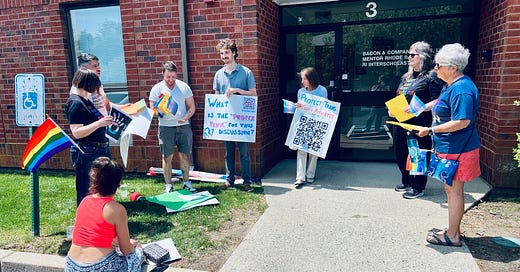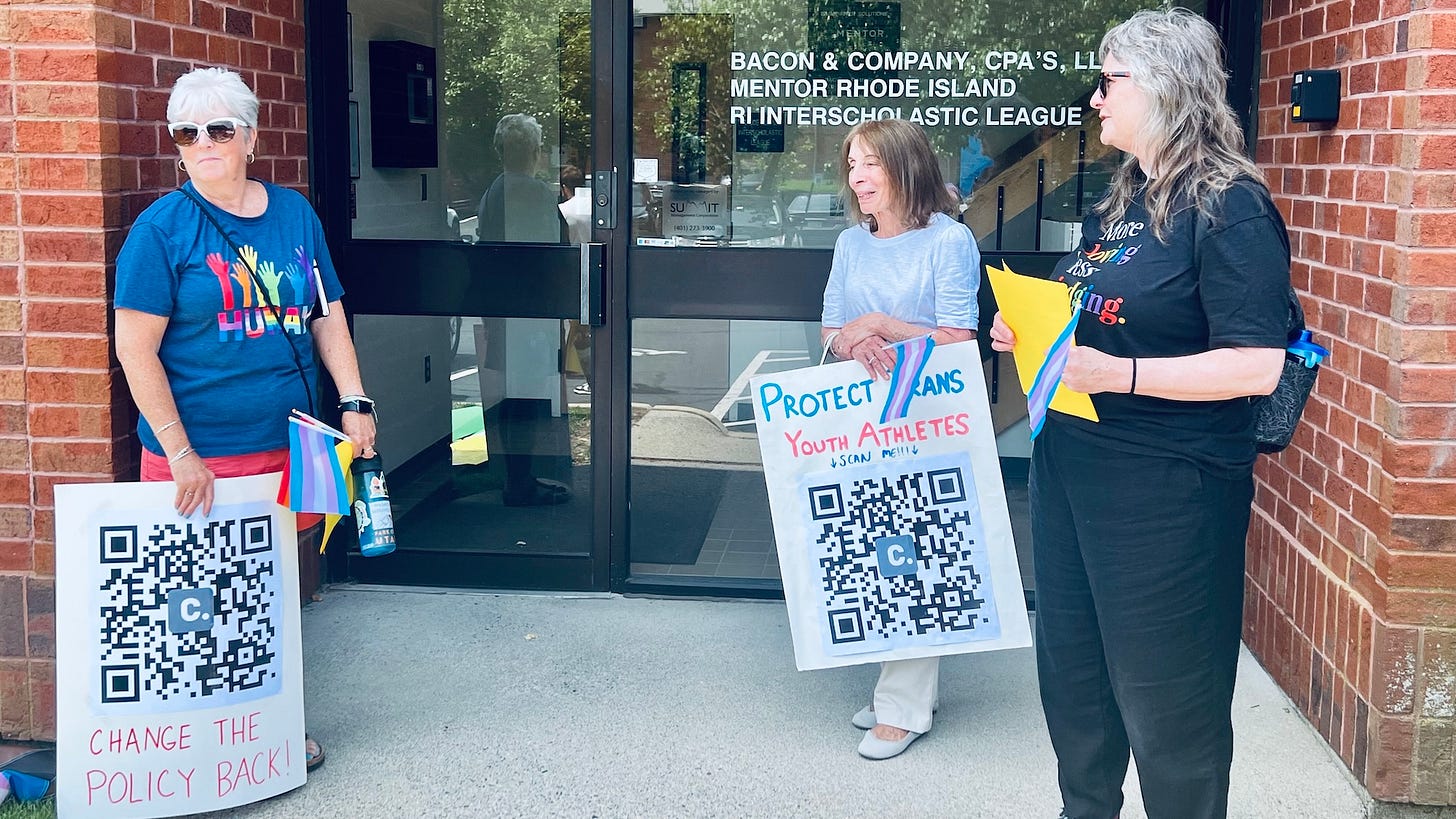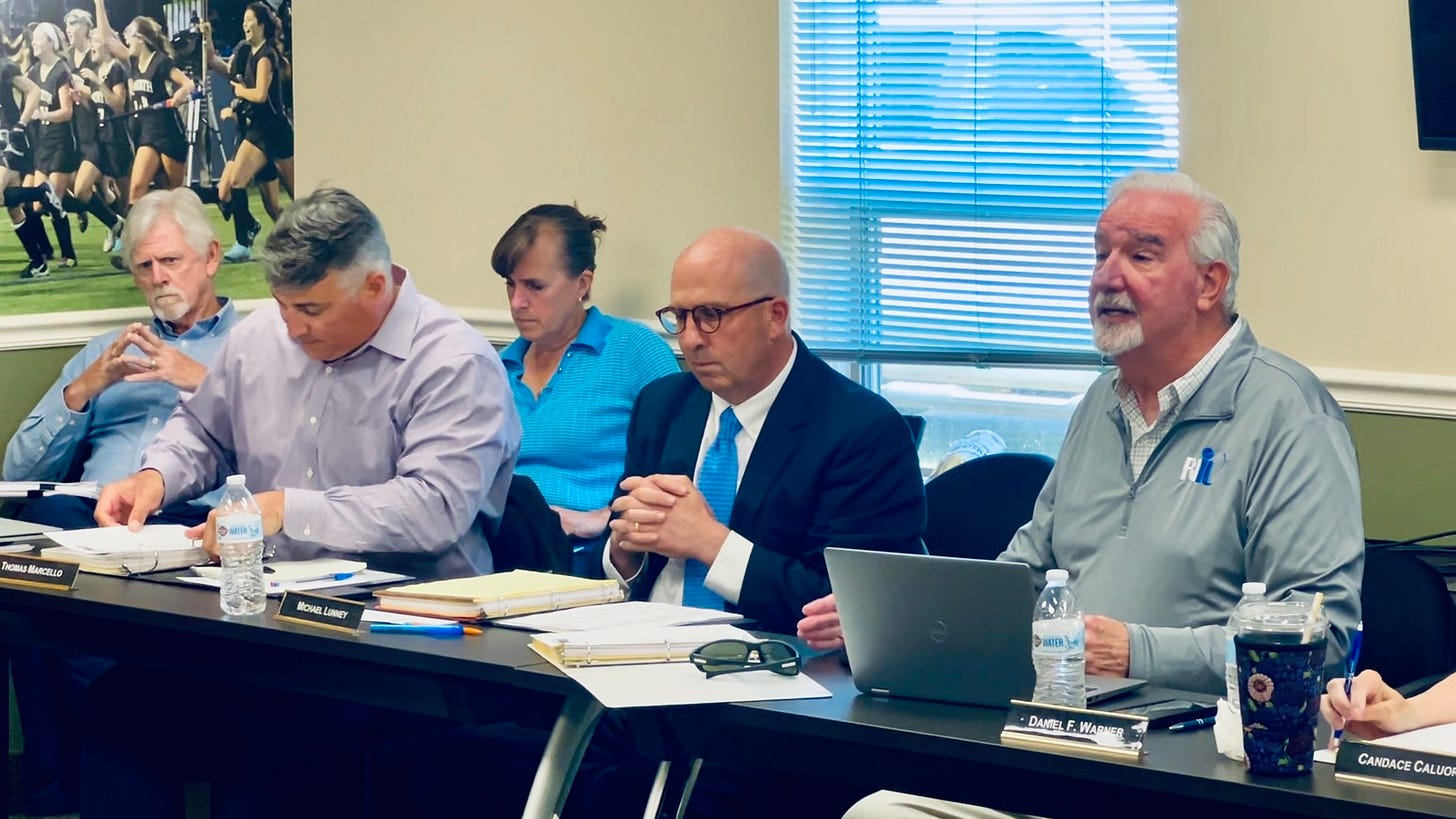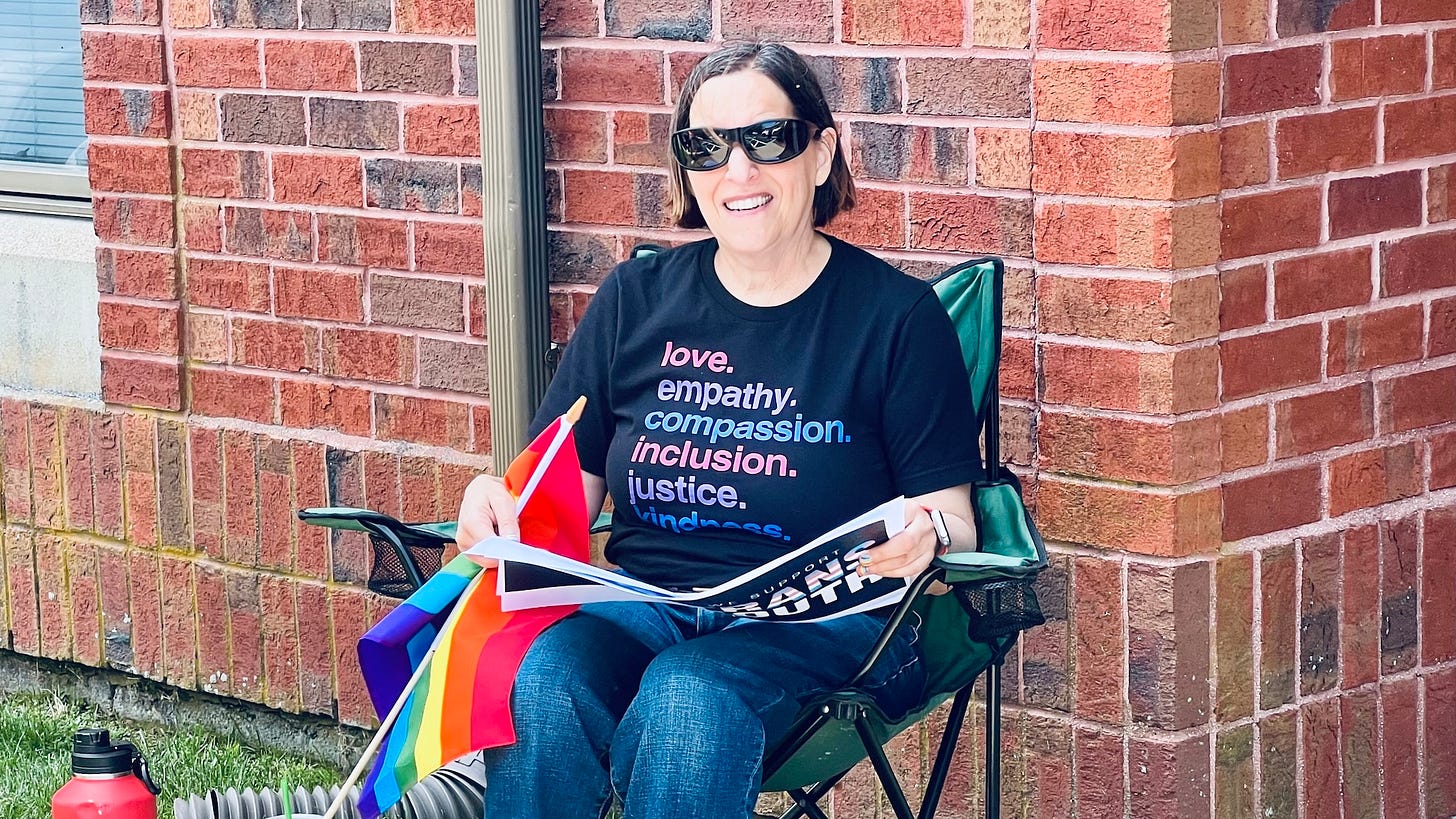Rhode Island Interscholastic League: Policy change is not a change and not a policy
Language protecting transgender, gender-diverse, and transitioning student-athletes has been removed, replaced with language deferring to school principals when determining eligibility for athletics.
The Rhode Island Interscholastic League (RIIL) comprises 60 public, private, and parochial high schools, providing governance and leadership in the implementation of athletic programs and interscholastic competition. On March 7, to “get ahead of… new policies coming from the federal government,” RIIL altered the wording of its policy regarding transgender, gender-diverse, and transitioning youth participating in sports. Whereas previously, RIIL specifically stated that students had the right to participate in sports in alignment with their gender identity, that language has been removed in favor of language stating that school principals determine student eligibility.
RIIL made this change despite clear guidance from the Rhode Island Department of Education (RIDE) and the Rhode Island Attorney General’s office, which sent out a letter to schools one week earlier. Still, as Daniel Warner, chair of the Principal’s Committee on Athletics (PCOA), said, RIIL is not a school, and besides, they were acting on the advice of legal counsel.
On March 24, around a dozen people attended a public meeting at RIIL to express their concerns about the policy change. (See: The RI Interscholastic League refuses to answer basic questions about changes to its transgender student-athlete policy)
After months of fruitless work trying to get RIIL to acknowledge their concerns, around a dozen people attended yesterday’s meeting to follow up and get answers. The discussion between those concerned about trans youth and RIIL leadership frustratingly went in circles, but was also quite revealing.
Here’s the video:
PCOA Chair Daniel Warner: So, is there someone who would like to speak? You folks aren’t on the agenda. As we said last time, and we are happy to have you, if there’s an issue that you want us to discuss or deal with, you need to go to one of your local high schools and ask that principal to put it on the agenda.
Syed Menebhi: We did that a lot.
Daniel Warner: And we haven’t heard from anyone.
Syed Menebhi: We have email chains where RIDE responds to local principals.
Daniel Warner: Is there someone who’d like to speak on behalf of your organization?
Syed Menebhi: Sure. I didn’t prepare anything, but essentially, we have reached out many, many times since our last meeting because you had said this is not the proper venue. We had individuals in the community reach out to their principals, then to RIDE, about possibly adding this to the agenda or holding a public forum to discuss the decision to change the policy. One individual straight-up told us, “We don’t plan on having public comment on this.” This is fine, but we’re being told to reach out to be put on the agenda. We’re confused about that and where to go from here.
Daniel Warner: I’m disappointed to hear that, if you have a specific issue, people weren’t willing to listen to you.
Syed Menebhi: By people, do you mean RIIL, or what do you mean?
Daniel Warner: The people that you spoke to, if you had talked to a principal who didn’t bring it to our attention...
Syed Menebhi: We reached out and brought it to your attention. Yes.
Daniel Warner: That you have brought it to their attention
Syed Menebhi: And they have reached out to RIDE and brought it to y’all’s attention. We’ve also had members of the public reach out.
Kathy Brown Couchon: Do you not understand the policy that we’re talking about?
RIIL Director Michael Lunney: Well, yes, but again, if somebody would like to speak to it, I think that what Dan is saying is we’re happy to hear you.
Syed Menebhi: Yeah. Okay. We spoke last time, too. We were told that that wasn’t the proper venue. So, are we deciding now that this is the proper venue?
Michael Lunney: Yeah.
Syed Menebhi: Okay. At the March 24th meeting of the Principals Committee on Athletics, community members came together to send a message that the league should restore its old gender eligibility policy, which was supportive of trans youth. Today, in the middle of Pride month, we return to you with a message and a question. The message is that we’d like you to change the policy back. We remain committed to the position that RIIL should restore its former policy, which honored the dignity, worth, and belonging of all its student-athletes. When we last spoke, 500 people had signed our petition demanding that RIIL change back its former policy. Today, we have almost doubled that number to 975 signatures.
The Massachusetts Interscholastic Athletic Association has stood by its trans youth athletes. The Connecticut Interscholastic Athletic Conference has stayed strong in its commitment to the participation of all youth. There’s no reason that we should have less courage on this issue than our neighbors to the north and west. This Pride month, do the right thing and change the policy back.
Our question was, “When is the meeting?” At the March 24th meeting, as I said, we were told that while we were welcome to observe, the PCOA was not the proper venue for community members to be heard. When petition signers made subsequent calls to RIIL, they were told that you have no plans and no obligation to hold a public meeting, [but] holding a genuinely accessible meeting, one scheduled after traditional work hours, is important to honor the public part of the Interscholastic League’s quasi-public status.
There are students, educators, parents, and representatives of the LGBTQ+ community who deserve a say in this matter. Furthermore, you owe the public some transparency about how the March 7th decision was made. RIIL represents more than 50 high schools, more than 60 middle schools, and more than 20,000 individual athletes. The decision to remove language supporting all youth was made by 11 people at an off-schedule special meeting of the PCOA. Deciding whether or not to withdraw support from an entire community is not a minor, practical concern, like changing a logo or deciding which website hosting company to use. It is a momentous decision that should involve all relevant stakeholders, including all of the RIIL member principals. So, when is the public meeting, or what is the proper venue?
Daniel Warner: As I tried to explain last time, how this committee works is that we represent the principals of Rhode Island and the student-athletes. If there’s a specific issue, and what I’m hearing from you is that your issue is that you want us to go back to the language that we used in the past.
Syed Menebhi: Correct.
Daniel Warner: So, we follow the laws as they’re put out by the State of Rhode Island and the Rhode Island Department of Education. Yes. So, the change we made did not change the intent of the law or the way that we deal with student-athletes.
Syed Menebhi: Well, it did, because now principals decide, in their districts, their gender eligibility policies, when previously you had...
Daniel Warner: No, previously, the principals always dealt with eligibility issues.
Syed Menebhi: Like grades and whatnot. I understand that.
Daniel Warner: No, all eligibility. All eligibility. For a child to participate in athletics in the State of Rhode Island, it’s the principal’s responsibility to ensure that they acknowledge the eligibility list that makes their students eligible to play. We don’t determine eligibility.
Syed Menebhi: So maybe you can clarify for us then what was the policy change?
Daniel Warner: It was just a wording change.
Paul Pasaba: It’s not just a wording change. Previously, if a trans athlete wanted to participate and their principal was transphobic or not supportive, you guys had a stated commitment in your policy saying that all youth get to participate regardless of the gender listed on their records. You guys, in the past, had a stated commitment to that student to push back on the principal and say, “Hey, this student should be allowed to play.” Now you’ve removed any such commitment to that student. It is a policy change.
Daniel Warner: It’s not a policy change. And that commitment is still part of how we operate.
Paul Pasaba: So, go back to the old language.
Syed Menebhi: I guess we don’t understand the reason for the language change. If it’s the same policy.
Paul Pasaba: Massachusetts maintains this language. Connecticut maintains this language.
Michael Lunney: It’s merely clarifying what the school has already had to do. That’s all.
Syed Menebhi: But the wording is very different than the policy that you...
Michael Lunney: We’re just saying that’s what happened.
Kathy Brown Couchon: But the question is: If it’s the same, why change the wording?
Syed Menebhi: Right. What led to the policy change?
Michael Lunney: We understand. We heard you. We heard you.
Syed Menebhi: We’re just asking for clarification.
Michael Lunney: Our only statement is that we support all kids, okay? Everyone.
Paul Pasaba: Previously, you explicitly supported trans and gender diverse kids, and now you don’t. That’s a policy change.
Daniel Warner: No, we said we support all kids. It’s not a policy change. That hasn’t changed.
Steve Ahlquist: Is that like an “All Lives Matter” type of thing? Is that “All Lives Matter,” not just Black lives? Is that what you’re doing? It sounds a little bit like that.
Kathy Brown Couchon: May I ask a clarifying question? If a trans student wanted to play a varsity sport, what would be the procedure? They sign up to play field hockey, and she’s allowed to play. That’s your policy. Is that correct?
Daniel Warner: Our policy is that we receive eligibility lists from all schools. We depend on schools to report eligibility the way they would in their normal...
Kathy Brown Couchon: What would the eligibility say about a student?
Daniel Warner: The eligibility is done at the school level. That’s never changed. And again, those schools are required to follow all applicable laws, and that’s what our rule clarifies.
That’s simply all that happened. Nothing was changed. The intent wasn’t changed.
Syed Menebhi: I guess I’m just confused about why a change happened if the intent wasn’t changed. I guess I’m just still kind of stuck on that. There was language pulled from the policy, right?
Paul Pasaba: Commissioner Angélica Infante-Green and Attorney General Peter Neronha instructed all schools not to change their policies, as Rhode Island law hasn’t changed. Just hold the line and keep your policies the way they are. And you guys changed it anyway. You got that advice from the Department of Education, and you changed your language anyway. It is a policy change because before, you had a stated commitment to trans and gender diverse youth, and now you don’t have a stated commitment to them.
Kathy Brown Couchon: Is that true? That is no longer in the wording.
Daniel Warner: The Department of Ed came to us for guidance on this particular issue.
Syed Menebhi: Whose department of Ed? Rhode Island Department of Education?
Daniel Warner: The Rhode Island Department of Education.
Syed Menebhi: Came to you when? Before, when we switched the [language]. As far as we know, they didn’t even know about the switch.
Steve Ahlquist: That’s what I was told.
Daniel Warner: So, is there an issue? Is there a student who is being denied something? If there’s a specific issue dealing with a student-athlete in the State of Rhode Island, we’re happy to hear that. However, it must be brought to us by the principal from the local district. They have to bring it to us and say, Here’s an issue that we’re facing at our Block Island school.
Kathy Brown Couchon: Why should there even be an issue brought to you? On February 28, 2025, Commissioner Infante-Green and Attorney General Neronha issued guidance to schools about how their policies fit into newly issued executive orders. They instructed that “until the legal effect of the aforementioned executive actions is settled [Trump’s executive actions against trans youth], Rhode Island schools should not change current practices and procedures involving the rights of LGBTQ+ students and diversity, equity, inclusion, and accessibility programs.”
That was the directive. So, why, after February 28, am I confused as to why you would feel the need to change things under that directive that came from the Department of Education.
Michael Lunney: The easiest way that we can say this is to clarify that it’s the school’s responsibility to make sure that they follow the law.
Kathy Brown Couchon: But didn’t schools understand that before?
Michael Lunney: We’re a membership made up of principals who are required to do eligibility. On the advice of our legal counsel, we clarified our rules to make sure it was clear to our members, who are our principals, what their obligations were.
Paul Pasaba: This policy change was made in the dark. Our principal let us know, “I just got an email from the association that I’m a part of, from the league that I’m a part of.” This is weird. They never let us know that this was going to be a decision that would be made. This was made at a special meeting. Not put into an agenda beforehand, where somebody like our principal could come out and say, "Hey, I don’t agree with this. You should be standing by trans youth. The policy is fine the way it is." Our principal was not aware of this ahead of time. A member of your board was unaware that this topic was discussed at the last meeting.
Kathy Brown Couchon: If your group is the Rhode Island principals, did principals come to you asking for a change? Because they didn’t understand the policy?
Michael Lunney: We were contacted by schools to request clarification. Absolutely.
Kathy Brown Couchon: I’m confused about what the clarification would be if it were to support all students and not discriminate against them.
Michael Lunney: We’ve got to get on with the rest of our business agenda, but we support all students. Period. All of our schools do—a hundred percent.
Kathy Brown Couchon: Thank you for hearing us. So that policy has been voted on by the entire board. The policy change has been voted on, and it’s now in effect.
Daniel Warner: Again, there hasn’t been a policy change. All we did was reaffirm to our principals that they needed to follow state law as it dealt with this particular issue. We were trying to get ahead of it based on the new policies coming from the federal government...
Kathy Brown Couchon: Which are still in court and undecided.
Daniel Warner: Right. So, to get ahead of that, we were telling our principals, "You have an obligation to your students, and you are the ones who determine eligibility, not us."
When it finally gets out of the court, we may have to hear different cases or rule differently. But when those policies and executive orders first came out, we were advised to get ahead of this and reemphasize what principles are to do.
Kathy Brown Couchon: Interesting. Because the Department of Education said almost the opposite, that schools should not change anything.
Daniel Warner: We’re not a school.
Kathy Brown Couchon: I understand that. But you’re suggesting that principals change the policy.
Daniel Warner: No, we are telling principals that this has been the rule forever. It’s the principal who must determine eligibility. That’s all we reaffirm.
Syed Menebhi: Would you consider then reinstating the language that you had previously that said all student-athletes can participate in the league regardless of gender identity, that aligns with their gender identity?
Daniel Warner: Of course. But we would base it on something that comes out of the court. When this finally gets resolved, I’m sure we’re going to be faced with some issues that need to be dealt with. And at that time, if we need to change our policy, we will certainly do so. But we didn’t change our policy.
Paul Pasaba: But Rhode Island’s 2001 anti-discrimination law, protecting people based on gender identity, hasn’t changed. That’s the applicable law here. The executive order doesn’t apply to you guys. You guys don’t receive federal funds.
Daniel Warner: So that’s what we follow. We follow the law.
Paul Pasaba: Your old policy followed the law.
Daniel Warner: And so does our new policy.
Paul Pasaba: So it is a different policy.
Daniel Warner: It’s not a policy.
Again, it reaffirms the principal’s role. It’s such a delicate issue. It’s not this board’s responsibility; it’s the responsibility of the Local Education Authorities, the principal, and the town. If there’s an issue, that has to be brought to this board, and this board will decide. But again, we support all kids, gender or not, we support all kids playing for the Rhode Island Interscholastic League.
Paul Pasaba: You can’t ignore the historical context here. Removing explicit support for trans kids and gender-diverse kids in this historical moment means something. It’s not a neutral act.
Daniel Warner: We’re not removing support. All we did was reaffirm the roles and responsibilities of the principal of the building, as well as those of the local education authority. That’s where we get our marching orders from: the principal. This is the Principals’ Committee on Athletics, so we listen to the principals and we create and amend our rules and regulations to deal with that.
We support all the kids, and all we did with this word change was reaffirm what we’ve been doing for the past 50 years.
Syed Menebhi: You and I know that’s a little bit...
Michael Lunney: Listen, we have to get on with the rest of the meeting. We heard you. We understand. We appreciate you coming in.
Daniel Warner: Thanks for coming. We need to go into executive session at some point.








RIIL answered like weasels, scummy weasels. complete liars.
It was Kathy who spoke out at the meeting. (Don’t want to steal her valor ; )